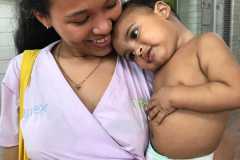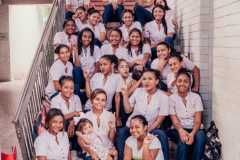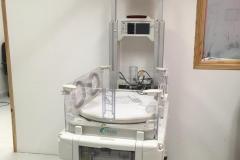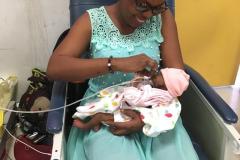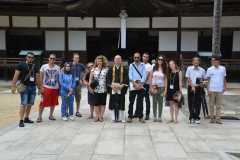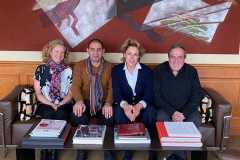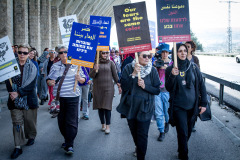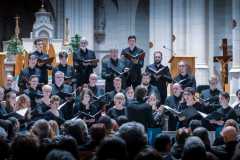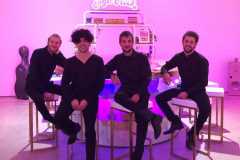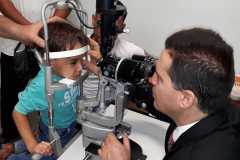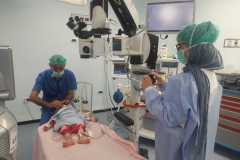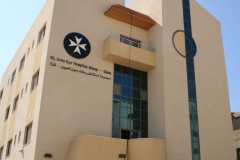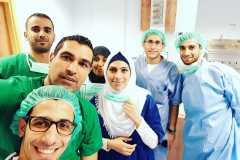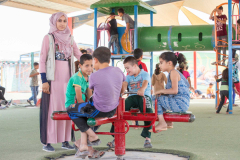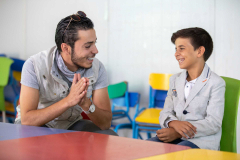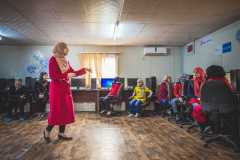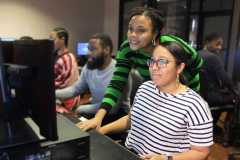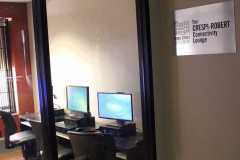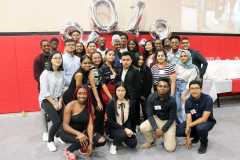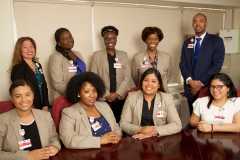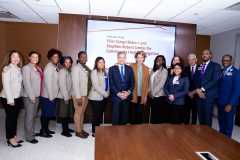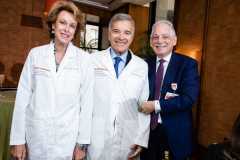Bahamas
Colombia
Ethiopia
Haiti
Israel/Palestine
Jordan
United States
Bahamas
When Hurricane Dorian ripped through the Bahamas in 2019, life in the islands ground to a halt. Thousands of homes were destroyed and residents everywhere were without electricity or a reliable food supply. Sea water flooded aquifers, making water undrinkable. With funding from Source of Hope, MercyCorps was able to provide immediate support by delivering lanterns, medical equipment, and other essentials, and also provided parts of the country with access to clean water.
Colombia
Juan Felipe Gomez Escobar Foundation
In 2000, Catalina Escobar lost her 16-month-old-son in a tragic accident. She had been working with young, low-income mothers near her home in Colombia, so she turned her personal tragedy into a mission: help the women escape the vicious cycle of poverty that devastates the City of Cartagena. She founded the Juan Felipe Gomez Escobar Foundation (JUANFE) which provides education and job training to hundreds of teenage mothers. For ten years, Source of Hope has provided support to the Foundation. JUANFE gives early healthcare to children and mothers and has reduced infant mortality rates and prevented death from malnutrition and disease. Babies born with the help of the program also receive after-care in the early months of life.Every year 20,000 patients, including expectant mothers, come to the Center for basic medical care. Catalina was chosen from more than 50,000 candidates, as a top ten CNN hero in 2012.
Ethiopia
Once forced to walk miles to collect their water from an unreliable well, 100,000 residents of the southern Ethiopian provinces of Konso and Derashe can now get clean water in their village center. MercyCorps built an aquifer designed to collect stream water high in the hills and pipe it directly into the villages through gravitational force. With the help of funding from Source of Hope, the area has seen a drastic reduction in the occurrence of life-threatening water-borne illnesses.
The result has been nothing short of life-changing. Now, the water is accessed from faucets in the center of the village, which work similarly to a kitchen sink. Women no longer have to worry about their personal safety nor the safety of the children they needed to bring with them on long walks to the wells. They are no longer in danger of developing spinal distortion from carrying large cans of water. In the village, a single pipe serves the faucet, and the only required maintenance is a filter that is changed once a year. Unlike the well, five miles out of the village, there is little risk of the faucet malfunctioning or breaking down. There is also a designated spout for washing clothes, as well as a trough for animals. Additionally, without having to spend most of a day walking to a well, children are able to attend school full-time. MercyCorps and Source of Hope have worked together to build two schools in the provinces to train women in business basics, with the goal of helping them start their own small enterprises.
Haiti
When an earthquake rocked Haiti in 2010, Source of Hope funded a grant to Partners in Health, a non-government organization that has been providing medical care in hospitals and clinics in Haiti for over a quarter of a century. This funding aided not only the initial emergency response to the disaster, but the long-term aid for the ravaged island. Source of Hope contributed funds to help build a new state-of-the art hospital in Mirebalais, one of the most modern hospitals ever built in a developing country. It even includes the first-ever CT scanner at a public hospital in Haiti. Source of Hope also aided in the purchase of numerous fold-out armchair beds in the children’s ward, to make overnight stays more comfortable for family members, who previously sat on crates or windowsills. As an expansion to the program, the Stephen Robert and Pilar Crespi Robert Regional Reference Laboratory opened in 2016 on the campus of Mirebalais Hospital. With a clinical lab, a pathology lab and Biosafety Level 2 and 3 labs, the staff is able to diagnose and treat infectious diseases, cancer and other life-threatening conditions, thereby elevating medicine in the region.
Israel & Palestine
Hand-in-Hand
Hand-in-Hand’s credo is “Learning Together- Living Together,” and the students who attend the integrated schools established by Hand-in-Hand, with help from a grant from Source of Hope, do just that. Children of both Jewish-Israeli and Palestinian-Israeli backgrounds learn alongside each other. Classes are taught in both Hebrew and Arabic. With six campuses throughout the region, they are the only integrated schools in Israel. Typically, the two distinct cultures are separated, and interaction is not encouraged. Friendships have grown among the students, and sometimes their parents. Their goal is to create a more peaceful, pluralistic and democratic society in Israel.
B’Tselem
Founded in 1989 by prominent Israeli lawyers, academics, journalists and members of the Knesset, B’Tselem helps people on both sides of the Israel-Palestine border document human rights violations. With cameras provided by the organization, residents can document incidents, creating a strong human rights culture in Israel. Many of the videos have been uploaded to YouTube, and viewed thousands of times.
Parent’s Circle
The Parent’s Circle is a joint Israeli-Palestinian organization of more than 900 families who have lost an immediate family member due to the prolonged conflict. They believe that a process of reconciliation is necessary to achieve lasting peace. Through dialogue sessions, public lectures and service projects in schools, the families are able to work through the grieving process. Members of The Parent’s Circle start to see that mourners on both sides of the conflict are grieving their loved ones equally, helping each other heal from unspeakable loss.
Polyphony
With music as its universal language, Polyphony seeks to bridge the divide between Palestinian-Israelis and Jewish-Israelis by bringing young people together through classical music. After all, two musicians playing Mozart together cannot hate each other. By educating both performer and audience in the art of listening and communicating, Polyphony seeks to further the development of a just and dynamic civil society in Israel. Polyphony has performed all over the world, including at the Henry A. Kissinger Prize Ceremony in Berlin; the Ghent Festival; the Lincoln Center Global Exchange in New York City; the Kennedy Center in Washington, D.C. and the Incontri di Siena Music Festival in Tuscany, Italy.
Just Vision
Just Vision increases the power and reach of Palestinians and Israelis working to end the occupation and build a future of freedom, dignity and equality using non-violent means. The group aims to highlight the efforts of journalists, community leaders and students through films, digital media and targeted public education campaigns. Their recent film, Naila and the Uprising, tells the powerful story of women on the frontlines of the conflict in Occupied Palestinian Territories.
St. John Eye Hospital
A disease causing blindness is ten times more prevalent in the West Bank and Gaza due largely to the lack of healthcare access. Source of Hope supports patient care through the St. John Eye Hospital in East Jerusalem and its satellite clinics in the West Bank and in Gaza. Patients are treated regardless of ethnicity, religion or ability to pay.
Training Program for Palestinian Engineers
Even graduates with engineering degrees are unable to find employment due to travel restrictions and the need for additional training. Through a collaboration with MercyCorps and Google, Source of Hope has also helped train Palestinian engineers to develop a software outsourcing industry based on the Indian model. The online structure of the program eliminates the need for travel, provides high-level employment opportunities, and boosts the Palestinian economy. Large international companies, including Cisco and Hewlett-Packard, have outsourced to Palestinian developers.
J Street
Founded by pro-peace, pro-Israel Americans, J Street is now regarded as a diplomatic leader pushing for a two-state solution to the Israeli-Palestinian conflict. J Street has educated members of Congress, taking some of them to the frontlines of the conflict. J Street has college chapters across the United States and is the only program for Jewish students providing travel to both Israel and the West Bank. In 2019, Source of Hope was honored with J Street’s Peace and Justice Award at its annual Gala Dinner in Washington, D.C.
Jordan
For the thousands of displaced Syrian children living in the Za’atari or Azraq camps, life can be empty and traumatic. Source of Hope is helping to restore optimism by providing educational opportunities and exposing them to the arts and sports. Funding from Source of Hope has helped create a network of educators, sports coaches and psychologists inside the camps.
United States
Henry Street Settlement
Since 2010, Source of Hope has been a supporter of Henry Street Settlement, a social service agency offering programs to benefit the underserved on the lower east side of New York City. Source of Hope supports the enhancement of housing facilities for abused women and their children. It has also created a computer room and a playroom. Additionally, Source of Hope has funded an educational program that prepares students for the SAT and teaches them essay writing and interview skills. In 2019, 130 high school students enrolled in the Expanded Horizons College Access Program, and admissions to 2- and 4-year colleges, including Ivy League, was 100%.
New York Presbyterian
Formerly, patients at New York Presbyterian’s Columbia University Medical Center waited as long as nine hours to be seen by staff. But thanks to an innovative new program in a facility built and funded by Source of Hope, those wait times have shrunk considerably and the average release time is now just two and a half hours. Doctors and nurses now have access to improved equipment and facilities, creating the opportunity for more rapid diagnoses and quicker treatment.
In New York City, it is not uncommon for non-English speakers and low-income patients to use the emergency room as their primary source of medical care. The Community Health Project of New York Presbyterian, funded by Source of Hope, trains volunteers to call ER patients or check on them at home and help them with tasks such as refilling medications, making appointments with specialists, and dealing with insurance companies. Since the program’s inception, repeat ER visits from this population are down by 50%. This personalized assistance recently led to the discovery of the cause of an asthma outbreak among children in Brooklyn, when volunteers made home visits and discovered rodents, mold and dust in the homes.
Memorial Sloan Kettering Cancer Center
Source of Hope helped the pediatrics department with funding the Touch Therapy Program operated through the center’s Integrative Medicine Service. Young cancer patients are soothed by therapeutic massage that eases the discomfort which accompanies some of the novel treatments that have been developed for this devastating disease. Relaxation techniques also alleviate anxiety, headaches, nausea and insomnia and they have been proven helpful in overall coping ability. Both parents and caregivers are taught these methods so they can help ease the pain of the patients.

